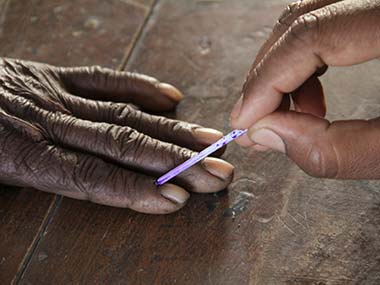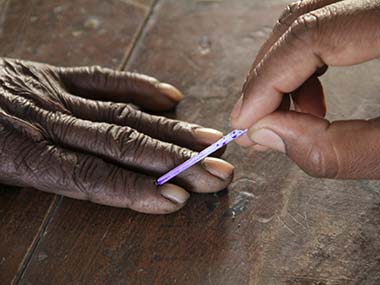By Badri Narayan Facilitating the transfer of the state’s resources to the marginalised and the poor – this was core vision which guided the enactment of the Panchayati Raj Act, 1992. The Act was also visualised as a medium to empower those at the bottom of the society through democratic representation. The results of the Uttar Pradesh Gram Panchayat elections 2015 reveal that a travesty of both ideals is in progress. Most of these who won were relatives of ministers, legislators or other influential persons. The winners included a cousin of cabinet minister Gayatri Prasad Prajapati, sister-in-law of minister Mehboob Ali, sister-in-law of Sitapur legislator Jheen Babu, brother of Azamgarh-based cabinet minister Balram Yadav, sister-in-law of DGP Jagmohan Yadav and daughter-in-law of state BSP president Ram Achal Rajbhar. [caption id=“attachment_2529790” align=“alignleft” width=“380”]  Representational image. Image courtesy: Reuters[/caption] The trend is indicative of the growing stranglehold of the dominant and the affluent on grassroots democracy. It also reveals that those seated at the apex of the hierarchal order in rural areas wish to swallow the resources and benefits accruing from the process of decentralisation. It has also been observed that with the spread of democracy in Indian society, there has been simultaneous growth and spread of violence and corruption. Corruption is more decentralised now. Gram panchayats of gram sabhas were bestowed with significant powers under the Panchayati Raj Act. Even the most insignificant gram sabha gets a minimum grant up to Rs 20 lakh. This allocation may soar to a maximum of Rs 50 lakh for larger gram sabhas. This amount directly reaches the pradhan’s account in the bank. The gram pradhan has three accounts - one for expenses on unmetalled roads and rural infrastructure, one for MNREGA, and the third for primary school maintenance, mid-day meals etc. Both direct transfer funds and poor accountability have been breeding and encouraging corruption. These are reasons why the powerful and the affluent with vested interest are keen on fighting elections at the village level and there’s cut throat competition to occupy the ‘new democratic space’ provided by gram sabhas. In Uttar Pradesh gram panchayat elections each candidate spent Rs 5 lakh to Rs 6 lakh. As empirically tested in our surveys, they spent Rs 500-Rs 1500 to ensure one vote. In many places silver coins were distributed. Meat and cheap liquor was provided free by contestants to their supporters and voters. The results reflect three points: one, most of those who failed to win did not have the power of money; two, those who have not developed their capacity beyond money shall not be able to participate in the panchayat elections; and three, such capacity remains confined to a few. The results are also indicative of the fact that democracy along with the spread of power and resources also spreads corruption and violence. An ethical question here arises as to how those representatives, who fight elections in aspiration for corrupt-use of public money and for their own vested interests, will ensure equitable distribution? There’s no clear estimation of the possible income of a panchayay head, but our experience in the field suggests that the ‘pradhani income’ comes anywhere between Rs 4 lakh and Rs 5 lakh even for smaller panchayats. There may be a section of elected pradhans which aspires to ensure development at the fundamental base, but the doubt that still remains is how far we have been able to be democratic.
Most of those who failed to win Gram Panchayat elections did not have the power of money; two, those who have not developed their capacity beyond money shall not be able to participate in the panchayat elections; and three, such capacity remains confined to a few.
Advertisement
End of Article
Written by FP Archives
see more


)
)
)
)
)
)
)
)
)



